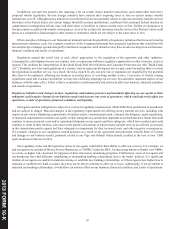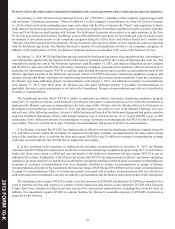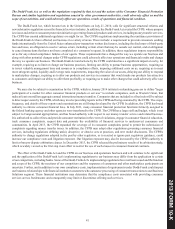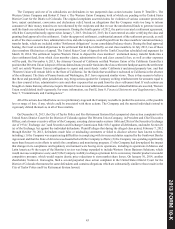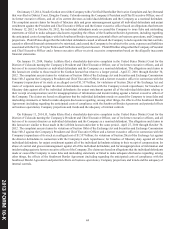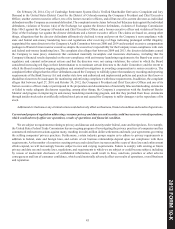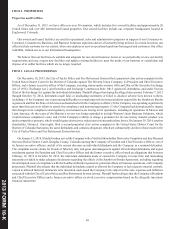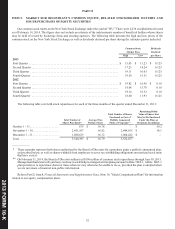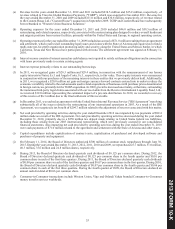Western Union 2013 Annual Report Download - page 155
Download and view the complete annual report
Please find page 155 of the 2013 Western Union annual report below. You can navigate through the pages in the report by either clicking on the pages listed below, or by using the keyword search tool below to find specific information within the annual report.
2013 FORM 10-K
45
On February 20, 2014, City of Cambridge Retirement System filed a Verified Shareholder Derivative Complaint and Jury
Demand in the United States District Court for the District of Colorado naming the Company’s President and Chief Executive
Officer, another current executive officer, two of its former executive officers, and all but one of its current directors as individual
defendants and the Company as a nominal defendant. The complaint asserts claims for breach of fiduciary duty against the individual
defendants, violation of Section 14(a) of the Exchange Act against the director defendants, violation of Exchange Commission
Rule 10b-5 against the Company’s President and Chief Executive Officer and a former executive officer and violation of Section
20(a) of the Exchange Act against the director defendants and a former executive officer. The claims are based on, among other
things, allegations that the director defendants affirmatively declined to stop and prevent the Company’s non-compliance with
state and federal anti-money laundering laws and regulations after receiving red flags indicating prolonged willful illegality,
reappointed the same directors to the Company’s Audit Committee between 2006 and 2014 and awarded excessive compensation
packages to Western Union’s senior executives despite the executives' responsibility for the Company’s non-compliance with state
and federal anti-money laundering laws. The complaint also alleges that between 2009 and 2013, the director defendants caused
the Company to issue proxy statements that contained materially incomplete and inaccurate disclosures, including that the
Company’s financial results depended on the non-compliance with anti-money laundering requirements; the Board was aware of
regulatory and criminal enforcement actions and that the directors were not curing violations; the extent to which the Board
considered increasing red flags in their determination to re-nominate certain directors to the Audit Committee; and the extent to
which the Board considered ongoing regulatory and criminal investigations in awarding compensation to senior executives. The
complaint further alleges that the officer defendants caused the Company to willfully ignore the mandatory recording and reporting
requirements of the Bank Secrecy Act and similar state laws and authorized and implemented policies and practices they knew or
should have known to be inadequate for monitoring and enforcing compliance with those requirements. In addition, the complaint
alleges that between April 27, 2010 and October 30, 2012, the Company’s President and Chief Executive Officer and one of its
former executive officers made or participated in the preparation and dissemination of materially false and misleading statements
or failed to make adequate disclosures regarding, among other things, the Company’s cooperation with the Southwest Border
Monitor and progress in improving its anti-money laundering monitoring program, and that they profited from those statements
through insider stock sales at artificially inflated stock prices and caused the Company to suffer damages via the repurchase of its
stock.
Additional civil actions or any criminal actions could adversely affect our business, financial condition and results of operations.
Current and proposed regulation addressing consumer privacy and data use and security could increase our costs of operations,
which could adversely affect our operations, results of operations and financial condition.
We are subject to requirements relating to privacy and data use and security under federal, state and foreign laws. For example,
the United States Federal Trade Commission has an on-going program of investigating the privacy practices of companies and has
commenced enforcement actions against many, resulting in multi-million dollar settlements and multi-year agreements governing
the settling companies' privacy practices. Furthermore, certain industry groups require us to adhere to privacy requirements in
addition to federal, state and foreign laws, and certain of our business relationships depend upon our compliance with these
requirements. As the number of countries enacting privacy and related laws increases and the scope of these laws and enforcement
efforts expand, we will increasingly become subject to new and varying requirements. Failure to comply with existing or future
privacy and data use and security laws, regulations, and requirements to which we are subject or could become subject, including
by reason of inadvertent disclosure of confidential information, could result in fines, sanctions, penalties or other adverse
consequences and loss of consumer confidence, which could materially adversely affect our results of operations, overall business
and reputation.



